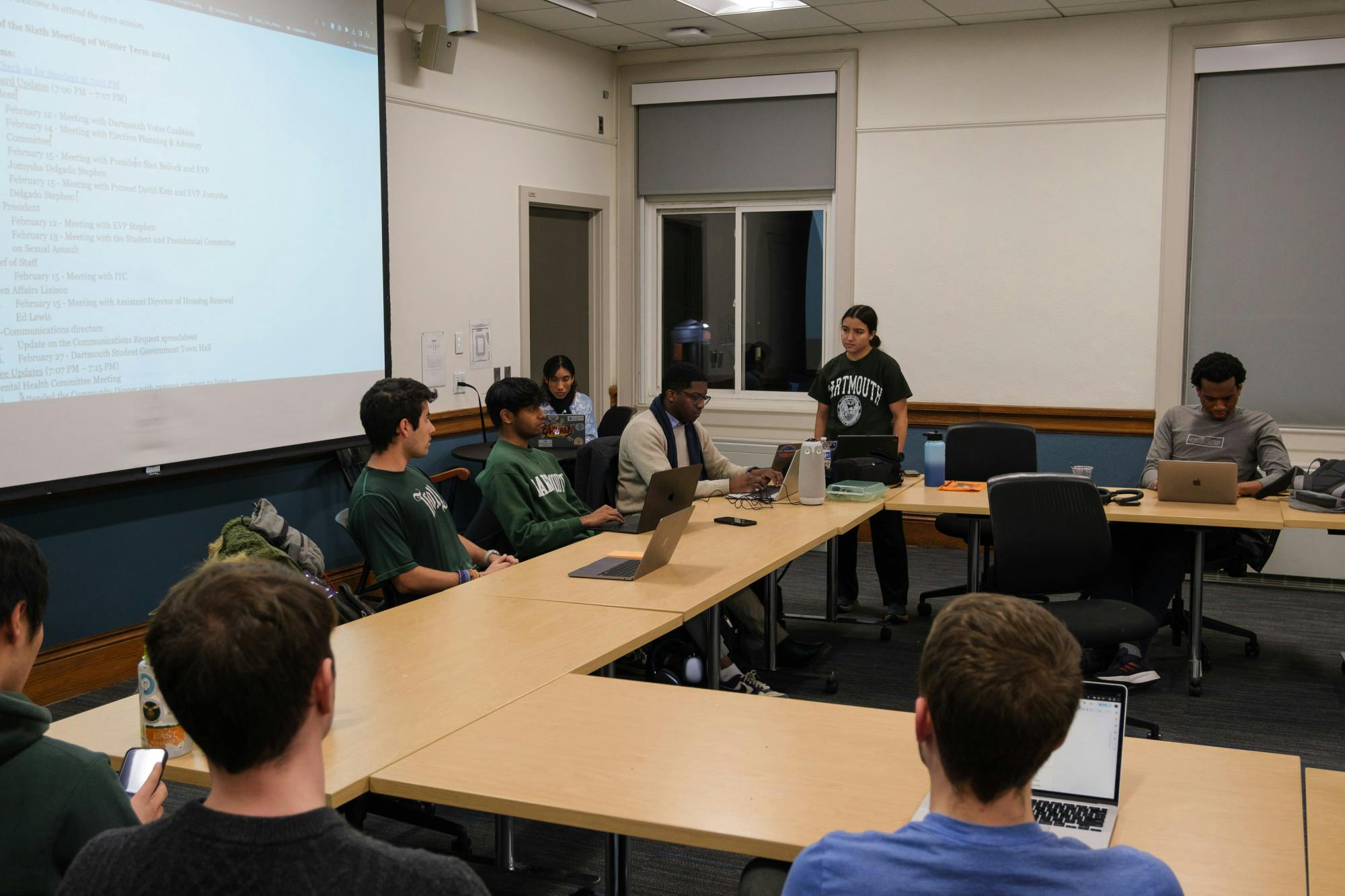On Feb. 18, the Dartmouth Student Government Senate met for its sixth weekly meeting of the winter term. Led by student body president Jessica Chiriboga ’24, the Senate discussed funding for a new campus bike-sharing program, methods for outreach to campus and recent meetings with campus administrators.
Wendell Wu ’23 presented a funding proposal on behalf of Dartmouth Bikes to replace Dartmouth’s current bike registration program — which is run by the Department of Safety and Security — with Project 529, a North American bike registration program founded in 2013 in Portland, Ore. Project 529 is currently used at colleges across campus, such as Northwestern University, Stanford University, Washington University in St. Louis and the University of Illinois Urbana-Champaign.
According to Wu, over 120 bikes are abandoned at Dartmouth each year. Although Dartmouth Bikes, a program run by the Dartmouth Sustainability Office, resells or rents out these bikes, the process is “a huge time sink.” In addition to the time it takes to collect and repair the bikes, Dartmouth Bikes does not have access to the registration information themselves, Wu said. Instead, they have to reach out to Safety and Security to verify ownership and that the bike has been abandoned.
Wu also explained that the current process is “technologically inadequate” and “incredibly time-consuming” because students must fill out their information on a physical card that a DoSS officer then enters into a database. In contrast, students can register their bikes in Project 529 by creating an account through the app or website.
Dartmouth Bikes would run Project 529, reducing the amount of bureaucracy involved in the process of bike registration and recovery, Wu said.
Dartmouth Bikes requested $2,500 to purchase approximately 1,000 registration stickers for the rollout of the program at the start of the spring term. Dartmouth Bikes and the Sustainability Office will fund the program.
Senators discussed the best method of funding for the program. SChief of staff Anthony Fosu ’24 explained that DSG has funded similar initiatives in the past. At the same time that DSG provided funding, they could encourage groups like DCSI to institutionalize support, he said.
An initial vote to provide the full $2,500 in funding passed with a 12-3-0 vote, but was challenged by senators who were displeased with the voting options.
After several options were proposed, Chiriboga suggested simplifying the options because the senators had already “indicated support for $2,500 funding by a majority.”
A final vote to either give $2,500 upfront or $2,500 conditional concluded with nine votes for $2,500 upfront, four for $2,500 conditional and two “present” votes.
Chiriboga also discussed meeting with the Dartmouth Votes Coalition, which includes DSG, the Dartmouth Civic Student Association, the Office of Student Life and Dartmouth’s NAACP chapter, to discuss voting efforts. According to Chiriboga, DVC hopes to provide transportation for students who need to vote in Lebanon in upcoming elections.
“There are students who live in Summit on Jupiter who … weren’t able to have easily accessible transportation [to the New Hampshire presidential primary on Jan. 30], so that’s something for us to think about in the spring with the town meeting and ahead to the fall for the elections then,” she said.
Chiriboga and student body vice president Kiara Ortiz ’24 also met with College President Sian Beilock and Executive Vice President Jomysha Delgado Stephen about the College’s recent decision to reinstate mandatory standardized testing for admissions.
In an email sent to all undergraduates on Feb. 18, DSG wrote that members who attended a meeting on Jan. 31 with senior leaders and the Office of Admissions “thought that the meeting would be an opportunity to provide input into the decision-making process” but realized that the decision had already been made, and the leaders instead “wanted feedback from DSG on how to communicate the reinstatement to students.”
Chiriboga said she and Ortiz reaffirmed that DSG “strongly advocates for and will continue to advocate for” student input in the decision.
“Our mandate is for the students — all undergraduate students on campus,” she said. “Our mission as an organization is always to push for more involvement of student voices.”
Ortiz also spoke about her meeting with the Student and Presidential Committee on Sexual Assault. During the meeting, they spoke about risk mitigation during Green Key and advocating for students to meet their Sexual Violence Prevention Project requirements before graduation.
DSG Senate meetings occur weekly on Sundays at 7 p.m. in Collis 101 and are open to all students.
Annabelle Zhang '27 is a reporter and editor from New Jersey. In the classroom, she studies Geography and Government modified with Philosophy and Economics. She enjoys creating recipes, solving puzzles and listening to music.




